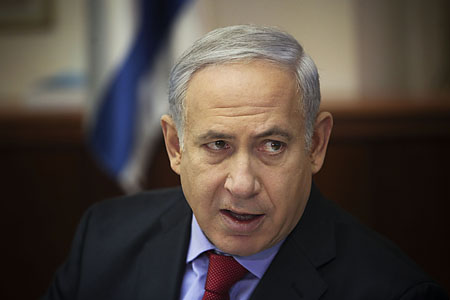
Israeli Prime Minister Benjamin Netanyahu talks during the weekly cabinet meeting on September 18, 2011 in Jerusalem, Israel. (Photo: Tara Todras-Whitehill / Getty Images)
“Let’s use New York for negotiations,” Israel’s minister for intelligence suggested to a roomful of journalist and diplomats bright and early Monday morning. And before the witching hour Israeli Prime Minister Benjamin Netanyahu was making it official:
“I call on the chairman of the Palestinian Authority to launch direct negotiations in New York and continue them in Jerusalem and Ramallah,” Netanyahu said in a statement broadcast as a text message around 10 p.m. That was 3 o’clock in the afternoon at the United Nations, where Palestine National Authority President Mahmoud Abbas had already met with Secretary General Ban Ki Moon. Netanyahu will depart Tuesday night Israeli time for the annual global confab, arriving in New York early Wednesday to join the Obama administration in trying to derail the Palestinian bid for UN membership, and with it statehood.
“I am offering President Abbas the chance to launch peace negotiations instead of wasting time on futile unilateral steps,” Netanyahu said.
There was no immediate response from the Palestinian side. But in interviews last week Abbas and other senior Palestinian officials were simultaneously dismissive of last-ditch offers designed to thwart the UN bid and emphatic that renewing “meaningful” negotiations with Israel would be the first order of business after the completion of their business in New York.
“I think we are very close in our positions,” said the intelligence minister, Dan Meridor, a Likud party moderate in Netanyahu’s right-wing coalition. A self-describe optimist, Meridor found hope in the progress made in closing the gaps between the two sides over the last two decades of talks. Palestinians say the same situation — 20 years without a resolution, while Israeli settlements on the West Bank continue to grow — is what is driving them to the United Nations. They say that Netanyahu’s right-wing coalition, often described as the most conservative in Israel’s history, is incapable of making peace.
Meridor disagreed. “I think this government is capable of doing it,” he said, noting that it was the first ever to agree to freeze construction of settlements, which it did for 10 months at President Obama’s insistence. That moratorium produced no new willingness from the Palestinian side, which continued for months to reject reopening negotiations.
But the morning also offered a glimpse of the full and wide spectrum of opinions within the Netanyahu government.
“The status quo is unsustainable in the long run,” Meridor told the gathering at one Jerusalem hotel. Four blocks away, a fellow, more hawkish minister had minutes earlier finished his own address to a different audience. Moshe “Bogie” Ya’alon, the minister for strategic affairs, was listing what he billed as the top ten “lies” repeated about the Palestinian conflict. At No. 4, he offered: “‘The situation is unsustainable,'” followed by an arch look. “How often do we hear it?” Ya’alon asked.

